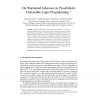Free Online Productivity Tools
i2Speak
i2Symbol
i2OCR
iTex2Img
iWeb2Print
iWeb2Shot
i2Type
iPdf2Split
iPdf2Merge
i2Bopomofo
i2Arabic
i2Style
i2Image
i2PDF
iLatex2Rtf
Sci2ools
105
click to vote
CCIA
2005
Springer
2005
Springer
On Warranted Inference in Possibilistic Defeasible Logic Programming
Abstract. Possibilistic Defeasible Logic Programming (P-DeLP) is a logic programming language which combines features from argumentation theory and logic programming, incorporating as well the treatment of possibilistic uncertainty and fuzzy knowledge at object-language level. Defeasible argumentation in general and P-DeLP in particular provide a way of modelling non-monotonic inference. From a logical viewpoint, capturing defeasible inference relationships for modelling argument and warrant is particularly important, as well as the study of their logical properties. This paper analyzes a non-monotonic operator for P-DeLP which models the expansion of a given program P by adding new weighed facts associated with warranted literals. Different logical properties are studied and contrasted with a traditional SLD-based Horn logic, providing useful comparison criteria that can be extended and applied to other argumentation frameworks. Keywords. argumentation, logic programming, uncertainty,...
Related Content
| Added | 26 Jun 2010 |
| Updated | 26 Jun 2010 |
| Type | Conference |
| Year | 2005 |
| Where | CCIA |
| Authors | Carlos Iván Chesñevar, Guillermo Ricardo Simari, Lluis Godo, Teresa Alsinet |
Comments (0)

